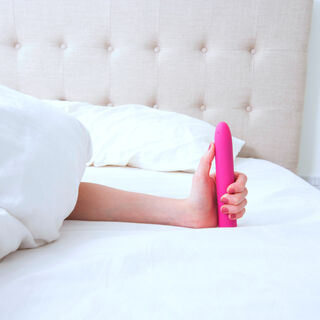Orgasm
Men See Women's Orgasms as a Reflection of Their Masculinity
Let's stop telling men to "make a woman orgasm." This message harms both sexes.
Posted June 30, 2021 Reviewed by Hara Estroff Marano
Key points
- Past research finds that men view women's orgasms during sex (not defined, so likely meaning intercourse) as reflecting their masculinity.
- We conducted a study (in press) to see if the type of stimulation matters (i.e. intercourse, manual/oral, or vibrator) to men's feelings.
- Men felt equally masculine and accomplished when their partner orgasms from intercourse or manual/oral stimulation—less so from vibrator use.
- Given research finding vibrator use is related to positive sexual functioning for women and men, we need education and encouragement to use them.
Sex and pressure don't mix well. Setting up orgasm as a goal to achieve makes orgasm less likely. Despite this well-known truth among sex therapists, many perceive orgasm as an indicator of successful sex and feel distressed by their or their partner's lack of orgasm.
When it comes to women's orgasms, interview-based research finds that men and women endorse the idea that it is a man's responsibility to "give" his female partner an orgasm. One such study found that men describe feelings of confidence and accomplishment in response to a woman experiencing orgasm with them. A recent quantitative study asked men to image that a woman they were dating who they liked very much either did or did not orgasm "during sex" with them. Men who imagined that the woman orgasmed "during sex" with them reported feeling more masculine than those who imagined their partner did not orgasm.
Perhaps you're wondering why "during sex" is in quotes. It's because the authors of this innovative study used this term without defining it. Given that the words "sex" and "intercourse" are used synonymously in our culture (a problem I address in a prior blog), it's reasonable to assume that the men in the aforementioned study were imagining a partner orgasming with them during intercourse.
This makes even more sense when considering what scholars have called our "current cultural script for sex," which involves “foreplay” (just to get the woman ready for intercourse) and intercourse (during which both the man and the woman are expected to orgasm). In this script, the man is responsible for the woman’s orgasm and “sex” ends when the man ejaculates. However, given that the overwhelming majority of women do not orgasm from intercourse alone, women commonly report faking orgasms during intercourse in order to protect their male partners’ egos and feelings of masculinity.
Given all this, follow-up researchers (including myself and two graduate students) speculated that men may feel more masculine and accomplished when women’s orgasms are caused by penile stimulation during intercourse compared to during non-intercourse partnered sexual activity (e.g., manual/oral stimulation or vibrator use). We thus conducted a study (currently in press in the Archives of Sexual Behavior) in which we asked men to imagine they had a sexual relationship with an attractive woman that they like very much and have had sex with three times.
Similar to the study this was based on, all men (193 in total) were asked to imagine that the woman tells them that she has rarely orgasmed with previous partners but has an orgasm every time the participant (1) has intercourse with her; (2) manually or orally stimulates her clitoris; or (3) uses a vibrator on her clitoris. While we hypothesized differences between all three groups, with feelings of masculinity and accomplishment being highest in the intercourse group, followed by the manual or oral group, and then the vibrator group, this isn't what we found.

We found that those who imagined their partner orgasmed through intercourse or manual/oral stimulation reported higher feelings of both masculinity and accomplishment than those who imagined their partner orgasmed with vibrator stimulation---with no differences found between the intercourse and oral/manual groups.
It thus seems that men feel more masculine when giving their woman partner an orgasm using their own body (their hands, mouth or penis) than using an external object (a vibrator), with the actual body part not mattering. Rather than providing evidence of the cultural script for sex that places the onus of women's pleasure on a man's penis, this finding is in line with the notion that men feel that women’s enjoyment of sex depends on their technique and skills as a lover.
Stated differently, it appears that men feel equally masculine and accomplished by stimulating a woman to orgasm, just so long as they perceive that the orgasm was induced through their own competence and not through an external object. It seems, then, that pervasive myths and misunderstandings regarding vibrators—including that they are a replacement for men or render men unnecessary in a sexual encounter—were influencing the men in this study to feel less masculine and accomplished when a vibrator was involved in their partner's orgasm.

This is quite a shame, however, given that two other studies found that women and men who use vibrators have better sexual health. One study found that women who use vibrators reported more desire, more arousal, more lubrication, more orgasms, and less sexual pain. According to one of the authors of the study, "The study about women's vibrator use affirms what many doctors and therapists have known for decades—that vibrator use is common, it's linked to positive sexual function such as desire and ease of orgasm, and it's rarely associated with any side effects."
This same study found that women's sexual satisfaction was highly related to their male partner's knowing about and endorsing their vibrator use. Additionally, the second study found that men who incorporate a vibrator into sex with women also have better sexual functioning, in terms of erectile function, intercourse satisfaction, orgasmic function and sexual desire. This latter finding could be due to those men who use vibrators genuinely understanding female sexual functioning and thus putting less pressure on themselves to "make" their partner orgasm. This is in line with one of my favorite quotes from Ian Kerner's book, She Comes First:
When we understand the role of the clitoris in stimulating [women], then sex becomes easier, simpler, and more rewarding. ... We open ourselves up to new creative ways of experiencing pleasure, ways that may not strike us as inherently masculine, but ultimately allow us to be more of a man. ... We can let go of the usual anxieties about size, stamina, and performance.
In short, both women and men could benefit if we let go of many sexual myths, especially those about vibrator use. Spread the word, spread the buzz!




